Iran
Youcef Nadarkhani, an Iranian pastor imprisoned for nearly three years for “apostasy” until his release in September when the charge was changed to "evangelizing," was reportedly re-arrested on Christmas Day and ordered to serve the remaining 45 days of his prison sentence.
Morning Star News reports:
“An Iranian pastor freed from prison in September after nearly three years of detainment was re-arrested on Christmas Day in a move that human rights groups consider intentional harassment for rejecting Islam. …
“Those close to the case and Nadarkhani’s family said the re-arrest may also have served as a direct message for the pastor to leave the Islamic Republic, according to Jason DeMars of PTM [Present Truth Ministries].
“It appears that it is a move to harass him,” DeMars told Morning Star News. “Perhaps they want him to leave the country permanently.”
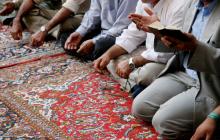
The variation in the proper way to pray is one among several differences that exist between Shiites, who make up about 15 percent of Muslims globally and in America, and the majority of Sunnis. Until recently, those differences mattered little in the United States, where the two groups bonded as Muslim minorities and prayed in the same mosques.
"There weren't enough of either to justify the cost of building sectarian mosques, and because in general, early generation immigrants were less focused on establishing formal houses of worship," said Andrea Stanton, a religious studies professor at the University of Denver.
That is changing, however, as American Shiites are increasingly establishing their own mosques. According to "The American Mosque 2011," a survey sponsored by several Muslim American organizations, 7 percent of roughly 2,100 mosques in America are Shiite, and most have been built in the last 20 years.
One reason: Shiites have become numerous and financially strong enough to manage the expensive process of buying or building their own mosques. Another factor: the growth in Shiite populations as immigrants flee persecution in Iraq, Bahrain, Saudi Arabia, Afghanistan, and Pakistan, where Taliban gunmen recently executed at least 22 Shiite bus passengers.

NEW YORK — Manhattan was a traffic nightmare as the United Nations General Assembly was in session and security precautions ramped up.
Iran's president gave his usual insulting address. Israel's prime minister volleyed with dire warnings of Iran's nuclear-weapons intentions. Not much was expected of a session that was more political podium than problem solving.
But the event did underscore a reality that Americans often overlook: Not everything is about us. The world doesn't turn on a politician's latest line of attack. The fine points of Obamacare or Mitt Romney's 1040 or Paul Ryan's budget? Meh.
On the one hand, this unconcern is nothing unusual; hometown affairs are always of far more interest to locals than to anyone else. I could go months without caring about Kate Middleton's topless cavorting or political show trials in Beijing.
On the other hand, it is good to be reminded that we are one piece of a vast global mosaic. We connect with others but aren't necessarily the center.
Rather than proceed as a nation-level version of the "narcissistic princess" — as one reviewer labeled tell-all author Monica Lewinsky — we should pay more attention to the connections among us.
Religious rights activists are hailing the release over the weekend of an Iranian pastor accused of apostasy and a Pakistani girl who was charged with blasphemy.
Pastor Youcef Nadarkhani was released on Saturday after a six-hour hearing, reported the American Center for Law and Justice, which worked to garner American support for the minister’s release. The Christian convert had faced possible execution.
“Your prayers, your advocacy, and your voice has been heard,” read an online announcement from ACLJ.
The U.S. Commission on International Religious Freedom welcomed Nadarkhani’s release “after being unjustly imprisoned for three years because of his faith,” said its chair, Katrina Lantos Swett.

According to a report late Friday from Christian Solidarity Worldwide, an international organization devoted to issues of religious freedom, Pastor Youcef Nadarkhani, a Muslim convert to Christianity who has been imprisoned by the Iranian government since 2009 on apostasy charges, has been acquitted and released from prison.
Nadarkhani, 35, previously had faced a possible death sentence for the charges against him, a result of his prostelytizing Muslims to convert to Christianity. He also refused to deny his Christian faith to save himself from execution.
Since his detainment three years ago, the U.S. State Department, the British government, the Vatican, Amnesty International, and a host of Christian organizations and leaders — including South Africa's Archbishop Desmond Tutu — have called on the Iranian government to release the young pastor.
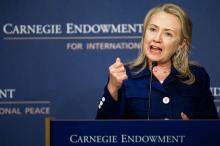
Religious minorities continue to suffer loss of their rights across the globe, the State Department reported on Monday, with a rise in blasphemy laws and restrictions on faith practices.
Almost half of the world's governments "either abuse religious minorities or did not intervene in cases of societal abuse," said Ambassador-at-Large Suzan Johnson Cook at a State Department briefing on the 2011 International Religious Freedom Report.
"It takes all of us — governments, faith communities, civil society working together to ensure that all people have the right to believe or not to believe," she said.
Christians in Egypt, Tibetan Buddhists in China and Baha'is in Iran are among those without religious rights, the report states.
In Pakistan, Saudi Arabia and Indonesia, people have been killed, imprisoned or detained because they violated or criticized blasphemy laws. In Indonesia, a Christian was sentenced to prison for five years for distributing books that were considered “offensive to Islam.”
These statutes, the U.S. government says, silence people in countries that claim to be “protecting religion.”
The State Deparment yesterday released a statement on the imprisonment of Iranian Christian Pastor Youcef Nadarkhani, who has been imprisoned for over 1000 days on charges of apostasy.
Organizations and countries has been calling for his release since he was imprisoned, but Iranian authorities has yet to agree to release him. A new date for Pastor Nadarkhani's trial has also been set recently.
Read the statement in full below:
U.S. DEPARTMENT OF STATE
Office of the Spokesperson
For Immediate Release July 9, 2012
2012/1118
STATEMENT BY VICTORIA NULAND, SPOKESPERSON
Continued Imprisonment of Christian Pastor Youcef Nadarkhani and
Repression of Minorities in Iran
We note that July 8 marked 1,000 days Christian pastor Youcef Nadarkhani has spent in an Iranian prison. Pastor Nadarkhani still faces the threat of execution for simply following his faith, and we repeat our call for Iranian authorities to release him immediately.
Unfortunately, Pastor Nadarkhani is not alone in his suffering. The Iranian regime continues to deny and abuse the human rights of its citizens, in particular those of its many ethnic and religious minorities. We are troubled by reports of the execution of four members of Iran’s Ahwazi Arab community, whose sentences were carried out with little due process. In March 2012, Iranian state media broadcast the forced confession of one of those executed.
We are also concerned by credible reports that prominent author Mohammad Soleimani Nia is missing following his release in May after five months in prison on unspecified charges.
We call upon Iranian authorities to respect and protect the freedoms and dignity of all its citizens, and to uphold its own laws and international obligations which guarantee such rights to all Iranians, regardless of their religious or political beliefs.
# # #
Youcef Nadarkhani, the 35-year-old Christian pastor has been imprisoned in Iran since October 2009 after protesting a law that all children read the Quaran and being charged with evangelizing to Muslims. The trial date has been set for Sept. 8.
From the Christian Post:
"According to Present Truth Ministries, which has been closely monitoring the pastor's case, Nadarkhani will presumably be tried for crimes against security. 'We assume by implication that this means the charges of apostasy have been dropped since the new charges have been issued, but we have no confirmation of that,' the ministry said Thursday."
TEHRAN, IRAN — Iran has released Pastor Mehdi “Petros” Foroutan who served about one year in prison following a police crackdown on his and other house churches, a spokesman told BosNewsLife late Tuesday.
Jason DeMars, who helped the 27-year-old pastor with advocacy, explained that Forouton was released on June 10. He added that the pastor "In total served about one year in prison for 'crimes against national security' because of his Christian faith."
At least two other Christian clergymen — Pastor Youcef Nadarkhani and another Christian leader, Behnam Irani — remain imprisoned. Nadarkhani faces the death penalty for refusing to abandon his Christian faith and return to Islam. He remains in Lakan Prison in the city of Rasht where he is still awaiting an official response from the local court about his future, DeMars said. Irani is held in Ghezal Hezar prison in Karaj city, despite his poor health. Prison officials reportedly refuse to allow him to visit a doctor.
Read more HERE.
CALLS FOR THE use of military force against Iran are dangerously misguided. Israeli bombing strikes are not capable of destroying Iran’s deeply buried and dispersed nuclear program, most experts agree. Attacking Iran would prompt a violent reaction that could plunge the United States into another war and unleash a regional conflagration. According to U.S. intelligence estimates, Iran has not yet decided to build a nuclear bomb. If attacked, Iran would almost certainly resolve to proceed.
Consider the lessons of history: Israel’s bombing of a nuclear reactor near Baghdad in 1981, far from ending Iraq’s nuclear program, prompted Saddam Hussein to accelerate that program and begin manufacturing weapons-grade uranium. When U.N. inspectors entered the country 10 years later, they discovered that Iraq was only a year or so from having the bomb. The inspectors dismantled Iraq’s nuclear program, succeeding where bombing had failed.
Sanctions and diplomacy offer a far less risky and more effective strategy for preventing Iran from acquiring nuclear weapons. To be successful, however, sanctions must be combined with incentives as part of a diplomatic strategy designed to achieve a negotiated settlement.
The Obama administration has convinced the U.N. Security Council and countries in Europe and beyond to join in a rigorous set of sanctions that have cut off financial transactions with Iran’s major banks and curtailed purchases of Iranian oil. As a result, inflation is rising, the Iranian rial has lost half its value in the past year, and economic hardships are mounting.
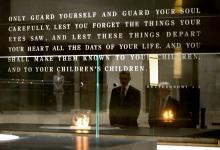
President Barack Obama on Monday vowed to crack down on Iran and Syria and promised to "never again" allow atrocities like those seen during the Holocaust. Speaking from the U.S. Holocaust Memorial Museum, Obama first toured the facility with Holocaust survivor and Elie Weisel.
Following is the transcript from Obama's remarks.
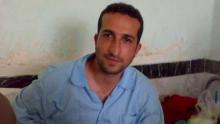
Last fall on God's Politics, we ran a few posts on the plight of Youcef Nadarkhani, a Muslim convert to Christianity who was arrested, charged with apostasy, tried, convicted and sentenced to death in Iran in 2010. We asked for continued prayer for the pastor and his family, and for people of conscience to speak out on his behalf.
Fast-forward five months...
As I was browsing through Facebook last night, I noticed a post on my news feed with the photo of a blindfolded man standing next to the executioner's noose and a headline that read, "Youcef Nadarkhani Executed."
My heart stopped for a moment. Please, no, I thought. And the guilt began to flood in: How could I have dropped the ball? If we had continued to sound the alarm on his behalf, would he have been hanged? Could we have helped save him if we'd done more?
I quickly went to Google to look for news reports of Nadarkhani's execution, reportedly on March 3. But I couldn't find any. Nothing on CNN, BBC, Al-Jazeera, NPR.
After searching for a while, I found a post by the American Center for Law and Justice that confirmed what had become my hope: Reports of Nadarkhani's execution were false.
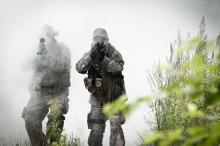
While compiling the morning “Daily Digest,” I often recall the advice of Karl Barth, who is said to have told young theologians “to take your Bible and take your newspaper, and read both. But interpret newspapers from your Bible.”
There are many mornings that Jesus’ advice comes to mind after reading the news. When you hear of wars and rumors of wars, do not be alarmed; this must take place, but the end is still to come (Mark 13:7). While I am not an end times apocalyptic, there are days that Jesus’ prophecy seems all too real.
In a speech to the American Israeli Public Affairs Committee’s annual policy conference in Washington, D.C. on Sunday, President Obama urged Israeli leaders to refrain from "loose talk of war" related to escalating tensions with Iran. Quoting his predecessor President Theodore Roosevelt, Obama said when it comes to the Iran situation, both the United States and Israel would do well to, "Speak softly... and carry a big stick."
Obama meets with Israeli Prime Minister Binyamin Netanyahu today at the White House. Netanyahu, who is scheduled to speak to the AIPAC conference this evening, issued a short statement repsonding to Obama's speech Sunday, saying in part, "I appreciated the fact that he said that Israel must be able to defend itself, by itself, against any threat."

Color The 1 Percent 99 Percent Conflicted; Congress Looks To Ethics Bill To Boost Public Image; Rick Santorum: The 'Church' Candidate; States Negotiate $26 Billion Deal For Homeowners; Religious Right Bashes Green Evangelicals For Supporting EPA Rules; Obama, Explained; Four Ways The U.S. Could End Up At War With Iran Before The Election; Employment Rate For Young Adults Lowest In 60 Years, Study Says; Keystone XL Tar Sands Pipeline: The Facts Deserve Repeating (OPINION); Study: GOP Votes Drive Public Opinion On Climate Change.

It seems like every day we hear from another politician saying that “we are ready to attack Iran if necessary," or from another pundit full of hot air telling us why we should invade Iran right now.
The presumptive Republican nominee, Mitt Romney, has said that he would support “something of a surgical-strike nature, to something of a ‘decapitate the regime’ nature to eliminate the military threat of Iran altogether.” President Obama has said: “Every option is on the table.” All of these conversations typically go along the lines of emphasizing how Iran poses a serious and immediate threat to the United States.
As was the case in the conversations leading up to the 2003 Iraq war, there is much heat, and not a whole lot of light.

A recent Gallup poll shows that 81 percent of Americans want the President to be focused on domestic issues, while 9 percent say they want him to focus on foreign policy issues. Not too surprising ... until you consider that the fastest growing domestic priority is the deficit (69 percent).
The lopsided number between the importance of the deficit and the importance of foreign policy is the first clue that, for most Americans, there’s a disconnect between domestic policy and foreign policy.
Clue number two is a bit more alarming.
The same poll indicates that 54 percent favor a “strong” stance — read: military attack — against Iran versus 39 percent who say that it’s more important to avoid a military conflict with Iran. Put these facts together and a disturbing picture emerges: the less Americans care about foreign policy, the more willing they are to go to war, and the less they’re able to see that war = skyrocketing deficits.
The disconnect couldn’t come at a worse time.

The End Of 'Compassionate Conservatism'?; Tunisia Faces A Balancing Act Of Democracy And Religion; Occupy D.C. Protest Stays Peaceful As No-Camping Deadline Passes; The Republicans' Hispanic Problem; What Does The Future Hold For Iran?; The End Of Health Insurance Companies (OPINION); Syria Unrest: Clinton And Hague Back Arab League Plan At UN; Inequality, The Middle Class, And Growth; Number Of Asset-Poor Americans Rising.
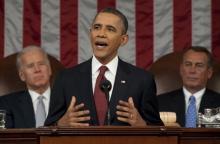
From President Obama's 2012 State of the Union Address:
The defining issue of our time is how to keep that promise alive. No challenge is more urgent. No debate is more important. We can either settle for a country where a shrinking number of people do really well while a growing number of Americans barely get by, or we can restore an economy where everyone gets a fair shot, and everyone does their fair share, and everyone plays by the same set of rules. (Applause.) What’s at stake aren’t Democratic values or Republican values, but American values. And we have to reclaim them.
Let’s remember how we got here. Long before the recession, jobs and manufacturing began leaving our shores. Technology made businesses more efficient, but also made some jobs obsolete. Folks at the top saw their incomes rise like never before, but most hardworking Americans struggled with costs that were growing, paychecks that weren’t, and personal debt that kept piling up.
Read the full text of the SOTU Address inside the blog...